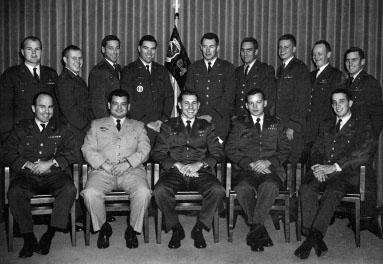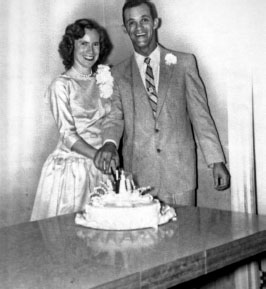Mayday Over Wichita (2 page)
Read Mayday Over Wichita Online
Authors: D. W. Carter
The 22
nd
Air Refueling Wing (ARW), located at McConnell AFB in Wichita, Kansas, received the first of many KC-135 jet tankers to replace the slower, propeller-driven and less capacious KC-97 fleet on October 4, 1963.
6
Soon thereafter, the KC-135s at McConnell were actively engaged in air refueling missions to support bombers. One such operation, known as Operation Lucky Number, involved the flight-testing of modified B-52s for low-level flying in Vietnam. The 70
th
Bombardment Wing, then located at Clinton-Sherman AFB in Oklahoma (which included the 6
th
Bombardment Squadron and 902
nd
Air Refueling Squadron), began strategic bombardment training and air refueling on February 1, 1963, with B-52s and KC-135s.
7
Between 1964 and 1965, the 70
th
provided “refueling support for experimental flight tests conducted by Boeing Company under contract to the USAF.”
8
Thus, Operation Lucky Number emerged as an arrangement between Boeing and SAC.
T
HE
A
IRMEN
The KC-135 they climbed aboard that morning was from Clinton-Sherman AFB, not McConnell. Likewise, the seven men flying Operation Lucky Number were from the 902
nd
Air Refueling Squadron (ARS) and the 70
th
Organizational Maintenance Squadron (OMS) at Clinton-Sherman, not the 22
nd
ARW. Aircraft commander, Captain (Capt.) Czeslaw “Chester” Szmuc; copilot, Capt. Gary J. Widseth; navigator, Second Lieutenant (2
nd
Lt.) Arthur W. Sullivan; and boom operator, Staff Sergeant (SSgt.) Reginald Went, were all from the 902
nd
ARS, while crew chief, SSgt Joseph W. Jenkins; assistant crew chief, Airman First Class (A1C) Daniel E. Kenenski; and assistant crew chief, Airman Second Class (A2C) John L. Davidson, were from the 70
th
OMS.
9
Capt. Czeslaw “Chester” Szmucâsquare-jawed with a muscular build, who had flown for nearly a decade and possessed an impressive flying recordâwas considered by his peers to be an extremely skillful pilot. Chester was a disciplined martinet: laconic, detailed and easily distinguishable as a military commander. His crew felt “he could manage anything that came in front of him,” as his copilot once said.
10
They respected him not because of his rank but because of his ability to lead. The oldest of the crew members at thirty-five, he was from North Royalton, Ohio, and unmarriedâthat is, except to the air force.

Captain Czeslaw “Chester” Szmuc.
AP Photo
.
He was also anxious to get on with the mission. Chester had called back to Clinton-Sherman AFB three times earlier in the week expressing his agitation about the assignment being scratched due to the cold and cloudy weather in Wichita. When Friday arrived, their mission canceled yet again on account of weather, they were now four days behind schedule. Chesterâtrying to avoid further delays and salvage the missionâcalled again at noon and obtained approval to run the mission on Saturday, January 16, at 8:00 a.m.
11
If the weather cooperated, his crew would finally complete their assignment and then recover at Clinton-Sherman. Chester was due home that Saturday.
Jeanine Widseth once told her mother she was going to marry someone who loved and respected her. When she eventually met Gary on a blind date on January 1, 1958, she knew she had found him. Tall and slender with clear brown eyes, Gary J. Widseth, the copilot, was twenty-six years old. He was born in Iowa and later moved to Minnesota, where he met Jeanine. As a child, Gary dreamed of flying and entered an aviation cadet program in 1958 before receiving his wings in September 1959. Gary was dynamic, jocose and very much a gentleman. He and Jeanine were married on September 2, 1959, and a good marriage it was. They adored each other. Always chivalrous, he once told Jeanine, “If I don't open the door for you, it's grounds for divorce.”
12
He kept his promise.
Gary was also skilled in his craft: aviation. He flew the propeller-driven KC-97, the predecessor to the upgraded KC-135 jet tanker, which he had now flown for two years and preferred over the much slower 97.
13
Jeanine made a hair appointment for that Saturday when she learned Gary was coming home after a long week of delays in Wichita. She couldn't wait for him to get back to her and their three children. Besides, she hoped he would arrive in time for them to attend a banquet that eveningâan event well worth her trip to the salon. Gary was her “dream man,” she would later say, remembering how handsome he looked in his flight suit, even though it was troublesome to iron.
14
Once, on the morning of November 22, 1963, when Gary was assigned to pick up some “important people” and fly them to Dallas, she labored tirelessly trying to iron wrinkles out of that awkward flight suit with all of its zippers and pocketsâonly to find out later her efforts were in vain when the mission to Dallas was canceled on account of President Kennedy's assassination. “The 1960s were difficult times for our country,” Jeanine expressed, but she never worried about Gary when he was out on his missions because he was in capable hands.
15
“They were a good crew,” said Jeanine, reflecting on her husband and his team.
16
Gary was due home that Saturday.

Captain Gary J. Widseth (fourth from left).
Jeanine Widseth
.

Captain Gary J. Widseth (back row, third from right).
Jeanine Widseth
.
Just returning from a temporary duty assignment (TDY) in Spain, not yet twenty-one years old, A1C Daniel “Danny” E. Kenenski was having the time of his life working as an assistant crew chief. He grew up in Harrisville, Rhode Island, and enlisted in the air force at eighteen after graduating from Burrillville High School in June 1963. Like many young men, Danny planned to put himself through college with the GI Bill and eventually become a pilot. As one friend described him, Danny “was very much on the ballâ¦knew what he wanted and how to go about getting it.”
17
Athletically built, with light green eyes and a fair complexion, Danny exuded confidence, drawing the attention of any room he entered. He was a voracious reader, but his passionâas the many letters he penned toldâwas writing. Danny wrote home at length, at different times and in various places, speaking of the new world he had found outside of Rhode Island and his experiences in the air force. In a letter dated May 16, 1964, he wrote about a disturbing KC-135-B plane crash at Clark AFB in the Philippines. Examining the wreckage the next morning, Danny described the crash to his family back at home: “It was a sight I don't ever want to see again in my lifeâ¦if one didn't know what a â135' looks like in detail he would surely not be able to distinguish this.”
18

Airman First Class Daniel E. Kenenski.
Irene Hubar (Kenenski)
.
Danny was also madly in love with his high school sweetheart, Carol Morgan, and planned to propose the following month on Valentine's Day. His mother, Wanda, excited for their bright future together, was holding on to the engagement ring until he returned.
19
Danny was due home that Saturday.

Second Lieutenant Arthur W. Sullivan.
AP Photo
.

Staff Sergeant Reginald Went with his wife, Vivian Bozeman.
Mark Carlisle
.
2
nd
Lt. Arthur W. Sullivan left behind the warm sunshine and clear beaches of Miami, Florida, to become a KC-135 navigator at Clinton-Sherman AFB in Oklahoma. Sullivan was clean-cut, witty and possessed the keen mind required to perform as a navigator on the KC-135âwith its heavy emphasis on physical sciences, meteorology and mathematicsâbefore GPS, inertial and other long-range navigation systems were commonplace. Now in the air force for two years, just starting his career at twenty-two years old, he was only one week away from welcoming his son Arthur Jr. into the world. His wife, Virginia, due to give birth back in Elk City, Oklahoma, was eagerly awaiting his return.
20
Arthur was due home that Saturday.